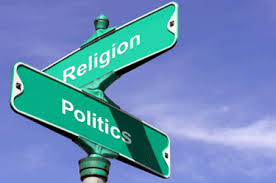This post was printed as an opinion column in the Abilene Reporter News, April 17, 2016
Now that the presidential candidates are no longer campaigning in the South and Southwest, they are touting their Christian credentials far less. Though there are many Christians in other parts of the country, the label is less salient as a demographic descriptor than it is in West Texas where I live.
Around here, it’s huge. In the recent local primaries, for example, candidates for practically every office listed “Conservative Christian” as one of their selling points. This label was used in conjunction with other predictable descriptors, such as pro-life, defender of the Second Amendment, anti-immigration, etc. There was little to distinguish one from another, including religious affiliation.
 I get concerned when “Conservative Christian” or “Evangelical Christian” is used as a campaign label, particularly when it is casually grouped with other political positions as if they were synonymous. They are not.
I get concerned when “Conservative Christian” or “Evangelical Christian” is used as a campaign label, particularly when it is casually grouped with other political positions as if they were synonymous. They are not.
Being Christian is not a simple or monolithic position. For some, being Christian is simply an affiliation, belonging to a particular denomination. Most of us were born into Christian families and we grew up in predominantly Christian communities. Being a Christian in such an environment is like falling off a log.
For others, to be a Christian is to make a conscious decision, coupled with a personally held set of beliefs. Yet, even that is not simple or singular. The differences in the decisions and beliefs among even people who sit in the same worship service are sometimes dramatic. What it means to be a Christian varies widely among believers who supposedly hold common beliefs.
Still other consider Christianity to be a matter of living a Christ-like life. It is attitudinal and behavioral rather than by affiliation or doctrine. “By their fruits you will know them.”
In short, being Christian is not a singular or simple matter, so when someone struts Christianity as a political label, I want to know what that means to them.
Watching candidates competing for the evangelical vote is like watching someone compete for “most humble.” It is grossly contradictory to what it means to be Christian for many of us. How can someone essentially be voted “most popular” among people whose lives should be characterized by humility, sacrifice, service, and “dying to self”?
Likewise, equating “Conservative Christian” with issues that involve insuring my rights is antithetical to the teachings of Jesus. Insuring your own rights or the rights of others, even when you disagree with them, may be patriotic, but it is not necessarily Christian.
In the same way that candidates simplify Christianity, they also simplify social and moral issues. This allows them to merge the issues with their Christian credentials. Yet, when those issues are examined through the eyes of the most vulnerable and whose lives are most affected, a notably Christian approach, none of the issues are simple.
 Even the most divisive issues like abortion, rights of same-sex marriages, or immigration are artificially simplified by seeing them through a single perspective, such as a denomination or a political party, rather than through the multiple perspectives of compassion for those who are most affected. When viewed as complex issues that have different consequences for each group affected, there is no simple Christian response that Republicans or Democrats can claim as their own.
Even the most divisive issues like abortion, rights of same-sex marriages, or immigration are artificially simplified by seeing them through a single perspective, such as a denomination or a political party, rather than through the multiple perspectives of compassion for those who are most affected. When viewed as complex issues that have different consequences for each group affected, there is no simple Christian response that Republicans or Democrats can claim as their own.
As a voting public, it does not serve us well to simplify the issues and to assume that our group has the final truth of the matter. When I assume I have the final truth, I leave no room for anything new. No new information, no possibility that someone else may possess a truth I might learn from, and no room for compassion for those who hold a different view.
There are theological and political implications when we do so. Politically, we are left with hateful rhetoric, entrenchment, and stalemate on issues that deserve our best and most compassionate efforts. Theologically we are left with an anemic Christianity that is shaped by the latest campaign drama rather than by the real needs of the world around us.
0 Comments until now
Add your Comment!